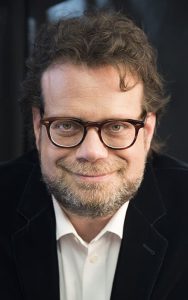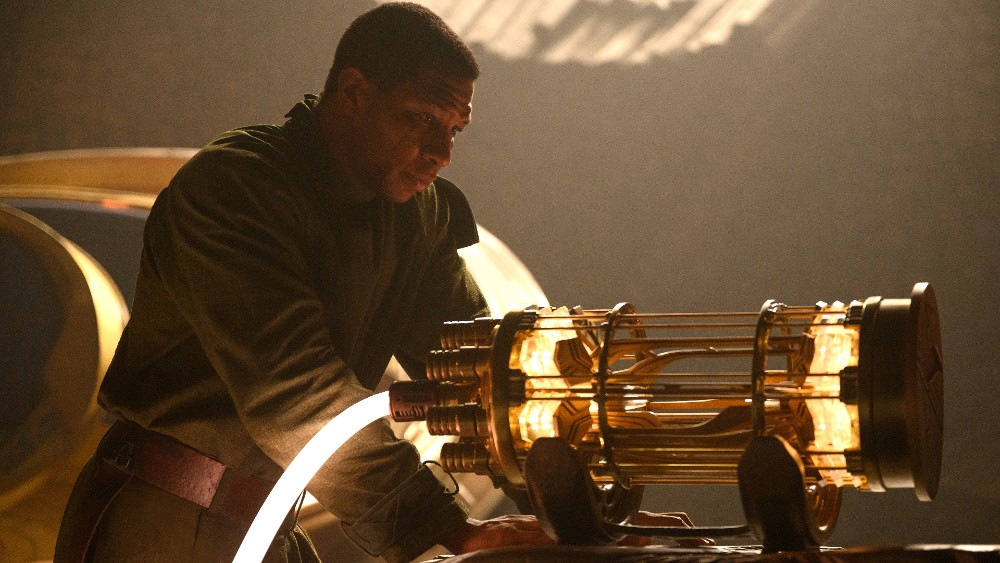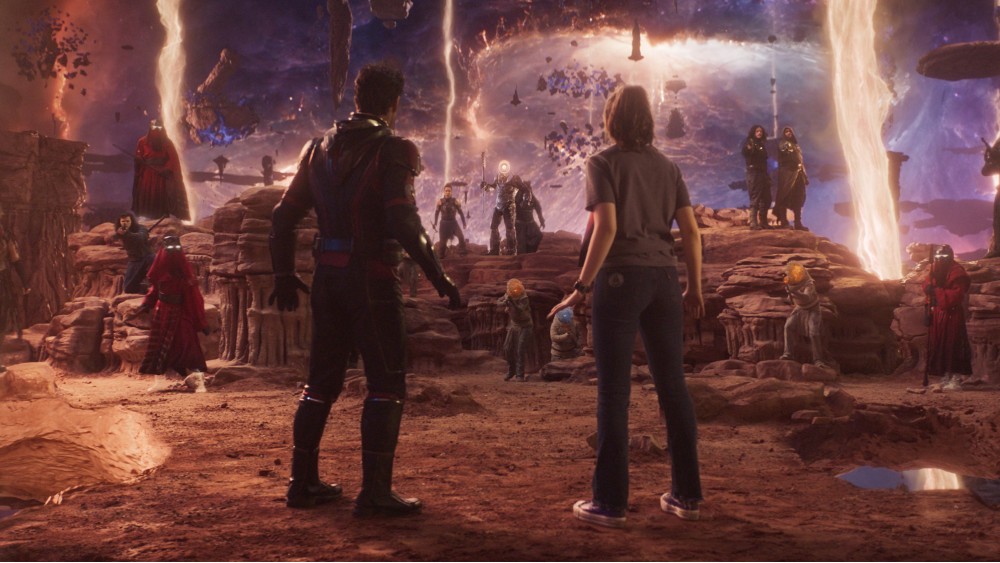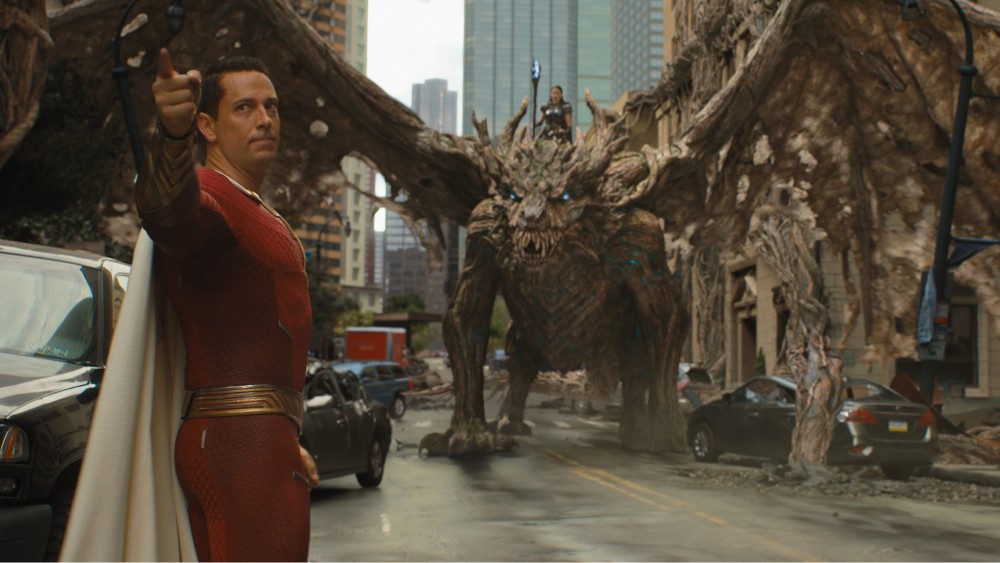There aren’t many composers who can spend a number of years scoring Marvel projects and then turn around on a dime and score a DC movie, but that’s exactly what Christophe Beck did when he tackled Shazam! Fury of the Gods, only to head right back to Marvel for Ant-Man and the Wasp: Quantumania — his third Ant-Man movie with director Peyton Reed. Though Beck scored the Shazam! sequel first, Quantumania wound up hitting theaters earlier, so the release of that superhero film marked the occasion for our chat below.
Beck has become one of Marvel’s go-to composers in recent years, and his colleagues at Disney have also taken note, enlisting him to score the animated blockbuster Frozen and its hit sequel. The Montreal-born composer won an Emmy in 1998 for his work on Buffy the Vampire Slayer, and then in 2021, he received a third Emmy nomination for scoring Marvel’s acclaimed series WandaVision, which allowed him to experiment with several different musical styles.
Below the Line spoke with Christophe Beck back in February, and we mainly focused on Ant-Man and the Wasp: Quantumania since we hadn’t seen Shazam! Fury of the Gods yet, though we still managed to inquire about the composer’s working relationship with that film’s director, David F. Sandberg.

Below the Line: I know you scored all three of Peyton Reed’s Ant-Man movies, but had you worked with him before those?
Christophe Beck: Actually, yes. Peyton’s first movie was a cheerleading comedy called Bring It On, which was 23 to 24 years ago, and that was also my first big-budget movie at the time — not a big budget, but let’s call it a medium budget — released by a studio, so it was [the] first big movie [for] both of [us]. Of course, it ended up being a bit of a surprise hit and launched both of our careers, and we’ve stayed in touch ever since then. He did a few other projects over the intervening years, but when Ant-Man came around, we found each other again, and we’ve been working together ever since.
BTL: Once Peyton knew he was going to make a third Ant-Man movie, how early did he come to you, and were you composing themes and other music before he started shooting or do you always wait for some kind of picture?
Beck: We had conversations early on. We knew that this film was going to be different from the previous two. The previous two films were sort of palate cleansers. They were released after big Avengers movies as a way to switch [up] the tone and to give audiences something a little bit more fun after the heavy drama of the big Avengers movies. But this was different. Peyton and Marvel knew that it would be different. They really wanted it to give these characters, [who] we’ve come to know and love in one way [in] the first two movies, a bigger role to play in the next phase of Marvel movies. It was an exciting opportunity for Peyton and an exciting opportunity for me, not only in terms of the scale and the scope of the story but also [because] we’d get to explore the Quantum Realm for the first time, really.
We’ve seen glimpses of it in the first couple of movies, but this was going to be the first opportunity to really dive deep and explore that micro-universe and the incredible new characters that inhabit it, [and] the incredible visual effects that we all get to see as audiences when we dive in. We wanted to explore new ways of capturing that musically, as well. Peyton called me, either before he started shooting or sometime during shooting, to let me know what was coming and to put my thinking cap on so that we could capture the otherworldliness and mystery and beauty of the Quantum Realm in a way that felt fresh and different from the previous two movies.
BTL: But do you typically start writing stuff as soon as you see any kind of script, or are you always waiting for some kind of picture or edit?
Beck: I will sometimes tinker with ideas, but it makes [more] sense for me to wait until I see some kind of a picture before diving in, especially a movie like this, which is so dependent on visual effects and so dependent on the chemistry between the actors to create what you see on screen. There’s only so much you can learn from a script. Typically, before writing what I would say are finished early drafts of music, I will wait till I see something.
BTL: I think I read that piano was your first instrument, so is that also your main instrument?
Beck: It is. I started with piano lessons when I was five years old, and that has always been my instrument. I’m not particularly great at it. I think I quit piano lessons when I was 15 — I had enough. I will say that as a film composer, being fluent in technology is just as important as being fluent [in] an instrument. I got my 10 years of piano study in, but I also got some time using technology to fool my parents into thinking that I was practicing piano.
I remember grabbing my dad’s reel-to-reel recorder — this would probably be in the early ’80s — and recording myself playing scales for half an hour, and then pumping that through the speakers from the upstairs room where the piano was, so my parents would think I was practicing piano, when in fact, I was just lounging on the floor, reading comic books. I would say that also prepared me for life as a film composer, because it was a way into using technology to make my work more efficient, if you want to put it generously.
BTL: Once you have some kind of picture for Quantumania, what’s next? Do you sit at the piano watching the film and come up with some ideas, or do you sit at the computer and start with a different instrument?
Beck: I’m not sitting at a literal piano; I’m sitting at a computer with a piano keyboard on it. I am very grateful that I have some piano skills so that the ideas I hear in my imagination, I’m almost always able to translate to my muscles and my fingers. I’m grateful for the years I spent studying piano for that. [When] the first reel came in, I remember very well the early days of working on the score. I went straight to the scene where they arrived in the Quantum Realm for the first time. Of course, the visual effects weren’t completed, so I had to use a little bit of my imagination, but we see the vistas, and it’s an awesome and beautiful and exotic place that they’ve landed in — they’ve never seen it before. [I] dove right into writing the “Quantum Realm Theme,” [but] what I wrote that day is not what ended up being the final “Quantum Realm Theme.” It took a few passes to hone in on that, but I remember that scene very well — that was what kicked it off.

BTL: Did you write a specific Kang theme, and do you think that’s going to be used for the next 10 years or however many movies he ends up appearing in?
Beck: That’s a great question, and a bit of a tricky question, too. We talked about that at the beginning of working on this [in terms of] what we’re going to do with Kang. I’m particularly fond of the theme Natalie Holt wrote for the Loki Disney+ series. There’s a variant of Kang in that show called He Who Remains. What’s interesting is that this Kang in Ant-Man and the Wasp: Quantumania is actually a different Kang. It’s a variant of Kang. In fact, there are infinite variants of Kang in the Marvel Universe, so we decided that we would write a new theme for him.
It took a little while to land on a theme. My first attempt was maybe leaning a little too hard into his melancholy. He’s been stuck there for a long time, and there are a lot of scenes in the film where you really feel his loneliness. My early attempts were also maybe a little bit musically complex and were trying to do a little bit too much. Once the footage of Jonathan Majors, the actor who plays Kang, started coming in, I saw just how much intensity he brought to the role.
One of the things you learn as a composer is when an actor gives an incredible performance, stay out of the way. And so, I simplified and simplified until I ended up with a very simple three-note motif that I could vary and create a theme out of, and just let his performance do the talking. In fact, there are a couple of scenes that we had scored fully that he was in that, at the last minute, in the final cut of the movie, we ended up dropping just because his performance was so incredibly effective.
BTL: You’ve scored many comedies, including the Hangover movies. Did you find yourself having to pull back on those comedic instincts since they aren’t as necessary for this Ant-Man movie even though it still has humor?
Beck: There’s [still] a lot of comedy in this one, and absolutely, my experience scoring comedies [very much] comes in handy. The nuances of comic timing, when to decide, musically, a comedic moment, and play an exaggerated emotion that a character might be experiencing in the story, or pause and take a step back and let a comedic moment happen without musical support. All those instincts come into play. What I also find incredibly helpful, from my experience with comedy, [which] is officially a genre unto itself, but in reality, it’s all genres.
I alluded a minute ago in the first part of my answer to your question about exaggerated emotions being captured musically. That’s really at the heart of comedy scoring, I think — to actually take the characters seriously, and just exaggerate it a little bit. What I found scoring those dozens of comedy films is [that] the actual style of music that gets used in those moments is all over the map. So it’s an incredible training ground for writing actually very dramatic music in a whole bunch of different styles. There could be a moment in a very frothy, silly comedy where a character feels heroic, and then I get to write something of an exaggerated superhero style. That experience comes into play when you’re actually doing a proper dramatic superhero film.

BTL: One of the things that amused me about the soundtrack was the track titles. I think “He Kang, He Saw, He Conquered” is pretty clever, and I’m not sure how you got away with “Kang Bang.” Meanwhile, “Sting Low, Sweet Variant” is another good one. Was that you, Peyton, or both of you? They point to a very specific sense of humor.
Beck: I take pride in my soundtrack titles. Our working titles, while we’re working on the film, are just boring, and I have a lot of trouble just putting out an album with those boring titles. For a number of years now, I’ve put some effort into coming up with titles that can entertain people who pay attention. In fact, we usually put up a whiteboard in my studio, and anyone who walks by, we kind of say, “The whiteboard is open. Anyone who has ideas for fun titles, put them down.” They tend to be puns, and I have to credit my Co-Composer on this score, Michael Paraskevas, for coming up with a lot of those puns. He’s really good at them, and that’s something I’ve been doing for a long time and take great joy in coming up with.
BTL: Yes, there are a lot of great puns. Are you just throwing out puns all day and sending people running?
Beck: I am. In fact, I got that from my Dad as a big punster, and I spent most of my life using a lot of my mental bandwidth to come up with wordplay. I have to admit, in recent years, I’ve tried to do it a little bit less so that I could reclaim some of my brain for more useful pursuits, but I still love a good pun and I’m still a huge fan of wordplay.
BTL: We talked a little bit about MIDI and doing stuff on your computer. I know this is a full, live orchestra that’s being recorded. Do you still use some of the samples blended in with the orchestra, or is it all the orchestra, and you just use the MIDI stuff for demos or the orchestrations?
Beck: The MIDI stuff is for demos, and I try whenever possible to use the full orchestra and a full orchestra only. There’s a certain magic that happens with all those incredible musicians pushing air around in a room like Abbey Road. Occasionally, things don’t quite go the way I had envisioned. Sometimes, I end up relying on the samples while I’m working on the demos and lose sight of what the actual orchestra can and cannot do. In those cases, we will bring in samples to sweeten the live orchestra, but we do it only when we have to.
I have to say on this score, we didn’t use it a lot. I’m very proud of that, actually — that 99 percent of what you hear on the album is [a] live orchestra. But occasionally, just for a little beef in the bottom end, or sometimes, to just save a little bit of time in the recording studio, when we know there’s a particular single note sustain that could easily be pulled off with a sample, we will go that way to save a little time or to beef up the sound.

BTL: I noticed that you also scored Shazam! Fury of the Gods, the next big superhero movie to hit theaters following Quantumania. Given all the Marvel stuff you’ve been doing, did you have to change your mindset at all while tackling the DC movie?
Beck: It’s not so much a DC versus Marvel thing as much as it is each movie has its own character and its own stylistic atmosphere musically that it wants to establish. I wrote the score for Shazam! Fury of the Gods before I wrote the score for Ant-Man and the Wasp: Quantumania, and in fact, it was supposed to have come out last year, I believe. I think when they saw that they would be up against Avatar 2, they decided to move it — probably a wise decision. It just happened from the luck of the draw and the chaos of the movie business that they ended up releasing so close together. I did consciously do a very different style of score for Shazam! than I did for Ant-Man.
For one thing, this Shazam! is a sequel to a film I did not score. The first film was scored brilliantly by Benjamin Wallfisch, who’s a friend of mine. He and the director, David Sandberg, decided that they wanted to capture the superhero aspect of Shazam. The themes are big, and the stakes are high, but it’s really about family. It’s a 16-year-old trapped in a superhero’s body. There’s a lot of fun that they’re having with it, and they made a choice to go classic superhero style in the grand tradition of John Williams‘ Superman, for example. It just made sense to follow in those footsteps, so the score for Shazam!, unlike the score for Quantumania, is really purely orchestral — no electronics, and a deliberate bit of a throwback vibe not only to [the first] Shazam!, but also, those classic superhero scores in the ’80s.
BTL: I can’t wait to hear and see it. I’ll be sure to ask David Sandberg about working with you when I speak to him.
Beck: We had a great time. I love working with David. He’s an incredibly efficient communicator, which I very much appreciate. He knows what he wants, knows how to ask for it, and rarely changes his mind.
BTL: I’m really interested in the work you’ve done over the past year, scoring television shows such as WandaVision and Hawkeye for Disney+. How different is it when you’re doing a show and have to write music for eight episodes as opposed to a two-hour movie? Is there a little bit of repetition involved in a series?
Beck: At the beginning of my career, I did episodic television — Buffy the Vampire Slayer, most notably. I remember in those days, doing TV was an episode a week, and you had no idea what was coming next. The episode arrived [and] you jumped right in as a composer. [You] do the work, maybe get one pass of notes, do some rewrites, [and] move on. It was a breakneck schedule, and as a result, an incredible training ground, of course, early in my career.
Doing Marvel’s Disney+ shows is a little different. It’s really like doing a six-hour [or] seven-hour feature film. I got a chance to read all the scripts before I started, so I knew where the story was going. I could make a plan. It felt a little bit less linear in terms of the process for me than traditional episodic television. We could be working on the beginning of Episode 4 while doing some last-minute rewriting on Episode 1, and in the middle of Episodes 2 and 3, all at the same time. It is a little bit chaotic, and it’s a huge workload. It’s really like doing a six-hour movie.
As a result, it’s grueling, just as Buffy the Vampire Slayer was grueling, but other than that, it really just feels like doing another Marvel movie. WandaVision, of course, had certain aspects to it that made it unique — all the different eras represented in each episode. That was so much fun for me to explore, but besides that, it really is very much like a six-hour movie.
BTL: I have to ask, but has Matt talked to you about Fantastic Four yet, or does that feel like something very far off in the future?
Beck: Yeah, that’s way in advance.
BTL: Well, those are all my questions, but before I let you go, a friend of mine wanted me to tell you how much he loves the Tower Heist score.
Beck: Oh, good. I love it. That’s one of my favorites, too.
Ant-Man and the Wasp: Quantumania and Shazam! Fury of the Gods are still playing in theaters, though the latter will be hitting VOD fairly soon. Quantumania arrives on digital platforms on April 18.





